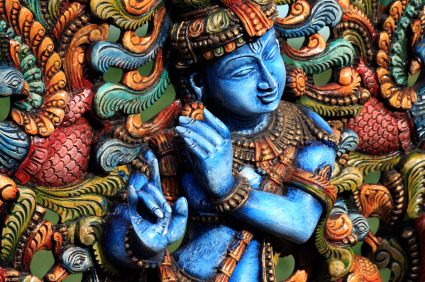Krishna is one of the most important deities in many Hindu traditions. He is the divine speaker of the Bhagavad Gita – a sacred Hindu script considered to be one of the most important texts in literature and philosophy. In the Gita, Krishna speaks with Arjuna, a warrior who is debating about going to war. Helping Arjuna with his deliberations, Krishna lays out Vedic and Yogic principles that go well beyond the context of Arjuna’s specific debate: The Bhagavad Gita is an overall philosophy for life. Here is what Krishna tells Arjuna (2.47-2.48) based on Stephen Mitchell’s wonderful translation:
You have a right to your actions,
but never to your actions’ fruits.
Act for the action’s sake.
And do not be attached to inaction.
Self-possessed, resolute, act
without any thought of results,
open to success or failure.
This equanimity is yoga.
It’s hard to find text that encapsulates so much wisdom in so few words. Inner peace comes when you are focused on the rewards of simply being proactive, liberated from preoccupation with results that will come in the future, immersed only in the preset moment. You just go on the road and enjoy the ride, leaving the safety of passivity and inaction to face the challenges of being out there. And, when you do that, results follow. As Lao Tzu, the father of Taoism wrote in the Tao Te Ching:
the more we don’t desire something,
the greater the chance of getting it,
and all the more exciting.
The 18th Century American philosopher and poet, Ralph Waldo Emerson said that “life is a journey, not a destination”. I would rephrase that and say that if your life is not a journey then you are not living. Emerson’s quote was adopted by Steven Tyler of Aerosmith in their song “Amazing”. Stephen rides a motorcycle (and even designed one). I wonder if Krishna would ride one too.
Get on the road and don’t miss out on the ride of your life.



